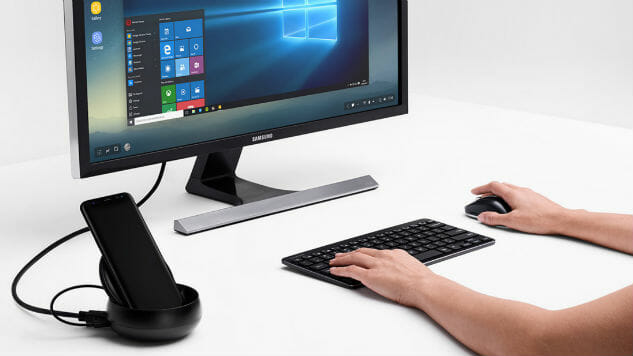
Despite being the giant of Android phones, Samsung clearly wants to go its own way. The company keeps finding different ways to try out new technology, resulting in their own smartwatch OS, VR, smart home tech, and now desktop alternative. The Samsung DeX arrived with the new Galaxy S8 and no doubt left a lot of consumers scratching their heads. It’s not an Android TV device, Chromecaster, or laptop dock. Instead, the DeX allows you to plug your phone into a TV (or monitor via HDMI), connect a keyboard and mouse, and use the setup as a kind of lite work machine.
A bit like a thick hockey puck, the DeX is a strange contraption. At $150, it won’t be an impulse buy for most new Galaxy owners, which sort of leaves the question of who it’s for up in the air. Assuming you’ve already decided to purchase the Galaxy S8 (or S8+), the extra $150 for the DeX only really makes sense if you either have no interest in owning a small laptop or Chromebook, either of which are probably more practical mobile solutions.
Getting over that hump, however, the DeX really feels more like a proof of concept than anything else. Connect your TV, mouse, and keyboard (there’s even, rather oddly, a LAN cable port), plug in the phone, and after a brief software update, you’re given a lightning fast desktop environment on your TV. I’ve played with a lot of Android TV solutions—from weird little boxes that hook to your TV and run pure Android to streaming the signal—and I’ve never seen any as seamlessly fast and responsive as the DeX/Galaxy S8 combo.

Functionality wise, the DeX is a lot like a Chromebook. It will run web browsers, optimized versions of MS Office, Google’s Office suite, and similar things, all in their own very Microsoft-like windows. You can minimize, maximize, move, and resize most windows just like a real desktop—although not necessarily true Android apps. So, if you need something for virtual paper shuffling, the DeX is surprisingly adept. Just plug it into that hotel TV and go.
The real problem is the lack of optimized applications. Samsung includes a DeX specific store, but it’s positively anemic at the moment and it would have made a lot more sense for the device to be able to at least access Chromebook apps. It can, however, run Android apps to varying levels of success. Facebook, for example, comes up as a non-resizeable phone-shaped window, which is odd and Spotify is, well, spotty. You can use the browser versions, but that’s frequently not as flexible a solution as a standalone app.
The DeX is an odd middle ground for a mobile work solution. It’s running a hybrid operating system that uses Android for its base, but isn’t as functional because of its need for a non-touch screen. It doesn’t have anywhere near the breadth of support of Chromebook and is unlikely to get it, but using the considerable hardware of the G8, it’s more powerful than most Chromebooks and super fast.

The phone functionality facet of this equation also plays into the appeal of the DeX. Calls and text messages can be answered and responded to when in DeX mode, so you can keep working while talking to the air or typing responses to texts. Granted, you can do this on regular laptops as well through the use of Google Voice and other apps, but it’s integrated rather seamlessly here. You can even easily switch to simply piping your actual phone’s screen to the TV if you want on the fly and back again to the DeX environment for, well, whatever reason.
If a pared down screenless laptop is what you’ve been after and you just sprang for the new Galaxy, the DeX is an ideal solution. It’s an excellent experiment showing where the future of mobile can and, certainly, will be going, but right now it’s of limited usage. The DeX can certainly help you do work in lonely hotels on the big screen, but then so can a cheap laptop or Chromebook—both of which offer a ton more applications.
Just the same, I can’t completely write the DeX off. Its speed, ease of use, and sheer novelty are impressive. If nothing else, it shows off just how beefy Samsung’s newest phones are and proves Samsung isn’t afraid to try strange new things.